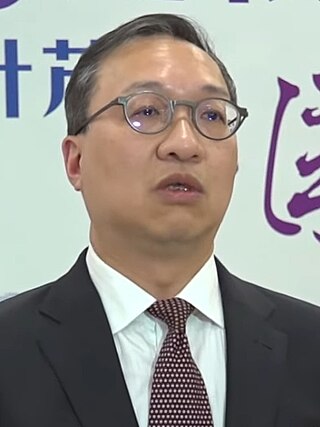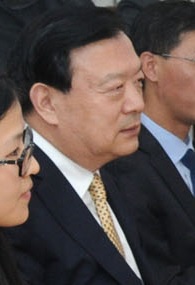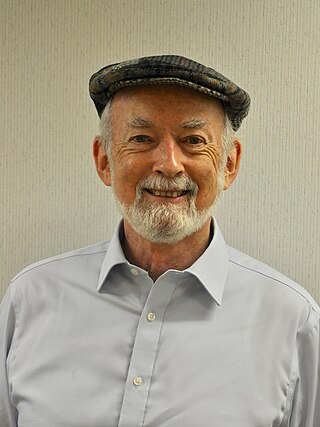
The Government of the Hong Kong Special Administrative Region, commonly known as the Hong Kong Government or HKSAR Government, is the executive authorities of Hong Kong. It was formed on 1 July 1997 in accordance with the Sino-British Joint Declaration of 1983, an international treaty lodged at the United Nations. This government replaced the former British Hong Kong Government (1842–1997). The Chief Executive and the principal officials are appointed by the State Council of the People's Republic of China. The Government Secretariat is headed by the Chief Secretary of Hong Kong, who is the most senior principal official of the Government. The Chief Secretary and the other secretaries jointly oversee the administration of Hong Kong, give advice to the Chief Executive as members of the Executive Council, and are accountable for their actions and policies to the Chief Executive and the Legislative Council.

The chief executive of the Hong Kong Special Administrative Region is the representative of the Hong Kong Special Administrative Region and head of the Government of Hong Kong. The position was created to replace the office of governor of Hong Kong, the representative of the monarch of the United Kingdom during British rule. The office, stipulated by the Hong Kong Basic Law, formally came into being on 1 July 1997 with the handover of Hong Kong from the United Kingdom to the People's Republic of China.

The Secretary for Education is a principal official in the Hong Kong Government, who heads the Education Bureau (EDB). The current office holder is Christine Choi.

The Chief Secretary for Administration, commonly known as the Chief Secretary of Hong Kong, is the most senior principal official of the Government of the Hong Kong Special Administrative Region. The Chief Secretary is head of the Government Secretariat which oversees the administration of the Region to which all other ministers belong, and is accountable for his or her policies and actions to the Chief Executive and to the Legislative Council. Under Article 53 of the Basic Law, the position is known as "Administrative Secretary". As the second highest ranking public official in Hong Kong, the Chief Secretary acts as Acting Chief Executive when the Chief Executive is absent.

The Financial Secretary is the title held by the Hong Kong government minister who is responsible for all economic and financial matters. The position is among the three most senior Principal Officials of the Government, second only to the Chief Secretary in the order of precedence. Together with other secretaries, the Financial Secretary is accountable to the Legislative Council and the Chief Executive for his actions in supervising the formulation and implementation of financial and economic policies.

The Secretary for Justice is the head of the Hong Kong Department of Justice, the chief legal advisor to the Chief Executive of Hong Kong, and the chief law enforcement officer of the Government of Hong Kong. Before the transfer of sovereignty over Hong Kong in 1997, the position was known as the Attorney-General of Hong Kong.

The Secretary for the Civil Service is the head of the Civil Service Bureau in Hong Kong. Unlike other secretaries for bureaux, the Secretary for the Civil Service is filled by an administrative officer from the civil service, who may choose to return to the civil service when his term expires. Before Principal Officials Accountability System was introduced in 2002, it was a civil service position.

Principal officials, according to the Basic Law, are government officials who are nominated by the Chief Executive and appointed by the State Council of the People's Republic of China. They include departmental secretaries and secretaries of policy bureaux. Five other officials are also principal officials because of the importance of their positions.

The Office of the Government Economist (OGE), formerly known as the Economic Analysis and Business Facilitation Unit, of the Hong Kong government was formed under the Financial Secretary's Office on 1 June 2004, when the HKSAR Government merged the Economic Analysis Division and the Business Facilitation Division.
Julia Leung Fung-yee, SBS is the Chief Executive Officer of the Securities and Futures Commission (SFC) of Hong Kong. She was formerly one of the undersecretaries appointed by the Government of Hong Kong in 2008.

The Secretary for Labour and Welfare of the Hong Kong Government is responsible for labour and social welfare policy in Hong Kong. The position was created in 2007 to replace portions of the previous portfolio of Secretary for Economic Development and Labour and welfare portion from Secretary for Food and Health.

Financial Services and the Treasury Bureau (FSTB) is a part of the 15 policy bureaux for the Hong Kong Special Administrative Region. They are responsible for developing and executing government policy on finance and treasury. The agency was established on 1 July 2002. The current Secretary for Financial Services and the Treasury is Christopher Hui and the under secretary is Joseph Chan.

Deputy Financial Secretary is a ministerial position in the Government of Hong Kong, deputising the Financial Secretary. The position was created in 2022 after John Lee took office as Chief Executive.

Eric Chan Kwok-ki is a Hong Kong politician who is the incumbent Chief Secretary for Administration since 1 July 2022. He was also the secretary-general of the Committee for Safeguarding National Security (2020–2022). Previously, he served as Director of the Chief Executive's Office (2017–2022) and Director of Immigration (2011–2016).

The Magnitsky Act, formally known as the Russia and Moldova Jackson–Vanik Repeal and Sergei Magnitsky Rule of Law Accountability Act of 2012, is a bipartisan bill passed by the U.S. Congress and signed into law by President Barack Obama in December 2012, intending to punish Russian officials responsible for the death of Russian tax lawyer Sergei Magnitsky in a Moscow prison in 2009 and also to grant permanent normal trade relations status to Russia.

Xia Baolong is a Chinese politician. Originally from Tianjin, Xia began his political career in the Communist Youth League. He served as the vice mayor of Tianjin, governor and Communist Party Secretary of Zhejiang province. Between 2018 and 2023, he served as a vice chairman of the 13th Chinese People's Political Consultative Conference (CPPCC), being its secretary general from 2018 to 2020. Xia was appointed director of the Hong Kong and Macau Affairs Office in February 2020.

The Secretary for Innovation, Technology and Industry, formerly Secretary for Innovation and Technology, is a Hong Kong Government position created in 2015 by the Leung Chun-ying government after years-long opposition of the pan-democracy camp.

The Committee for Safeguarding National Security of the Hong Kong Special Administrative Region is a national security committee established by the Government of Hong Kong under the Article 12 of the Hong Kong national security law. The committee is supervised and accountable to the Central People's Government of China.

John Anthony Miller OBE SBS JP is a former Hong Kong government official and civil servant, author, art collector and historian specialising in Chinese porcelain.















